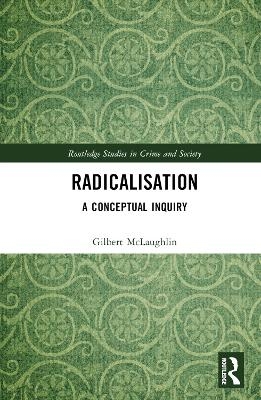
Radicalisation
Routledge (Verlag)
978-1-032-49662-7 (ISBN)
Radicalisation is a conceptual investigation within Western liberal democratic societies that follows an analytical framework linking expertise theory to discourse analysis of publications from the academic, governmental, and non-governmental spheres, as well as a dozen interviews with experts in the field.
The reader will come to understand the socio-political configurations that led to the emergence of radicalisation as an object of study. The book also identifies the historical tensions regarding models, definitions, and operationalisation of the concept of radicalisation in social sciences research. Finally, a new model explaining how the term radicalisation became the central conceptual framework of a new field of expertise will be proposed. The book is situated within the fields of security studies, crime prevention, and sociology of expertise. The book is innovative in its distinct focus on the term radicalisation and the expertise thereof. With its diachronic and synthetical approach, the book also serves as an entry point for all researchers and practitioners seeking an introduction to the subject of radicalisation and violent extremism.
The book addresses the debates among academics, public experts, and policymakers into the origin, dissemination, and maintenance of the field of expertise. Thus, the aim is not so much to uncover the 'true' meaning of the term as to understand how it has been socially constructed, this book will be of great interest to students and scholars of criminology, security studies, and sociology.
Gilbert McLaughlin is a lecturer in criminology at Liverpool Hope University, United Kingdom. He completed his PhD in sociology and MPhil in political thought from the University of Ottawa, Canada. His interests include beliefs and criminality, radicalisation, and violent extremism.
List of Figures
List of Tables
Introduction
Part I: Preventing Political Violence
Chapter 1: The Nebulous Origins of Radicalisation
Chapter 2: A New European Conceptual Framework
Chapter 3: Internationalisation of a New Prevention Paradigm
Part II: Making a Field of Scientific Research
Chapter 4: A Sociology of the Social Sciences Production of Knowledge
Chapter 5: The Challenge of Modelisation
Chapter 6: Tensions in the Operationalisation of the Concept
Part III: Building a Network of Experts
Chapter 7: The Emergence of a Public Issue
Chapter 8: Request of Expertise
Chapter 9: The Creation of a New Field of Expertise
Conclusion: A Look Back at the Emergence of the Term Radicalisation in the West
Index
| Erscheinungsdatum | 15.12.2023 |
|---|---|
| Reihe/Serie | Routledge Studies in Crime and Society |
| Zusatzinfo | 7 Tables, black and white; 13 Line drawings, black and white; 13 Illustrations, black and white |
| Verlagsort | London |
| Sprache | englisch |
| Maße | 156 x 234 mm |
| Gewicht | 612 g |
| Themenwelt | Geisteswissenschaften ► Philosophie |
| Sozialwissenschaften ► Politik / Verwaltung ► Europäische / Internationale Politik | |
| Sozialwissenschaften ► Politik / Verwaltung ► Politische Systeme | |
| Sozialwissenschaften ► Politik / Verwaltung ► Politische Theorie | |
| ISBN-10 | 1-032-49662-2 / 1032496622 |
| ISBN-13 | 978-1-032-49662-7 / 9781032496627 |
| Zustand | Neuware |
| Informationen gemäß Produktsicherheitsverordnung (GPSR) | |
| Haben Sie eine Frage zum Produkt? |
aus dem Bereich


